CarEdge saved me over 4,500 dollars on a brand new Honda Pilot. I can't say thank you enough.
Price intelligence
Find a wide range of vehicle listings with market insights on new and used listings near you.


Help us personalize your CarEdge experience — it only takes a second.
Your answers help us personalize your CarEdge journey — we’ll follow up with tips and next steps that match your buying timeline.

The best EVs under $50,000 are more capable than ever before. But that doesn’t mean that they’re equally suited for the diverse needs of today’s drivers. Whether you’re hauling a family or looking for your next ridesharing car, these are the best EVs under $50k that are available now.
To qualify for federal EV incentives, ensure you purchase a Tennessee-built VIN.
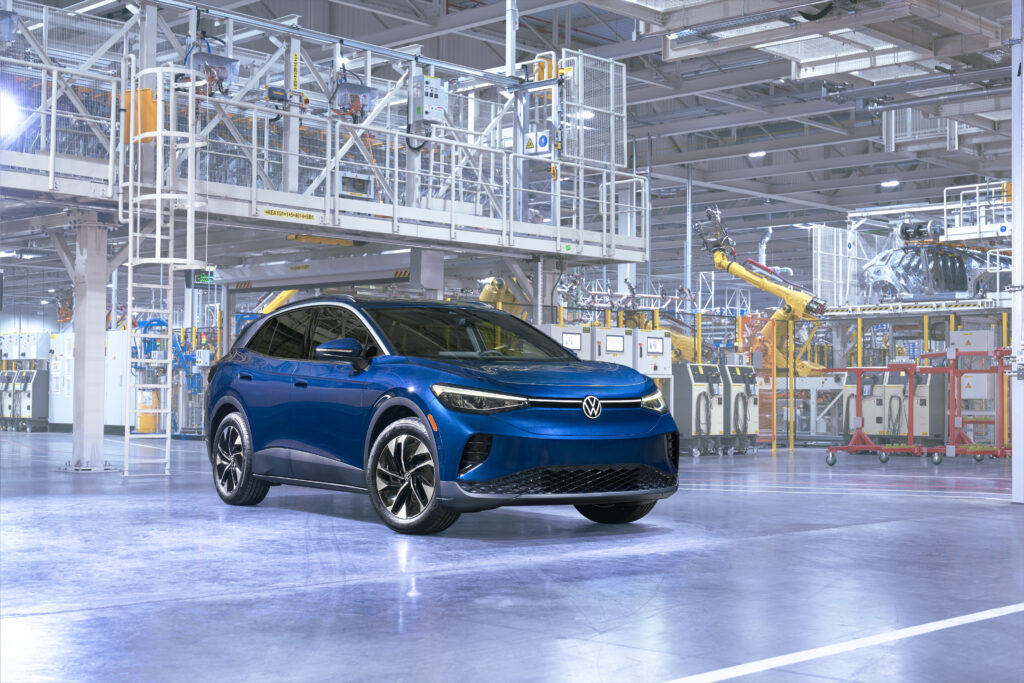
Price: $37,495 – $53,995
Range: 208 – 293 miles
Charging Speed: 130 kilowatts (standard) to 170 kilowatts (Pro); Add 200 miles of range in 28 minutes

Tax Credit: The U.S.-built ID.4 qualifies for at least half of the new EV tax credit. Make sure yours is built at the Chattanooga, Tennessee factory! See full details here.
Did You Know? The 2024 VW ID.4 includes three years of free 30-minute charging sessions at Electrify America. For those who travel often, this incentive could be worth hundreds of dollars.
Build and price your own ID.4 at vw.com
After a price drop, the cheapest Tesla is available for thousands less. No dealers, no markups!
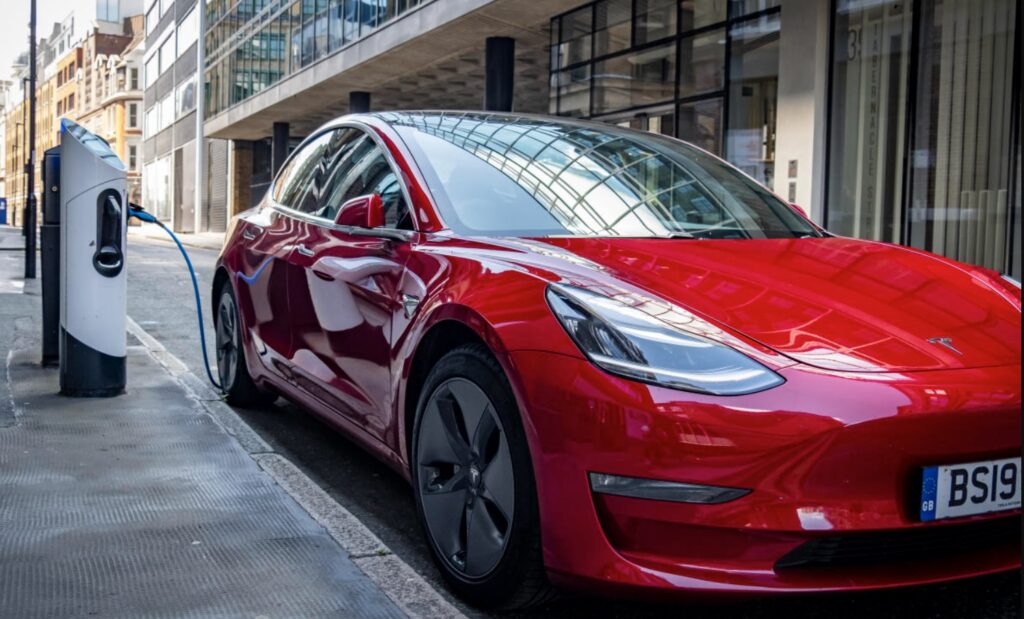
Price (rear-wheel drive): $42,380 (including destination charges)
Range: 272 miles
Charging Speed: 170 kilowatt max (adds 200 miles in 30 minutes of charging)
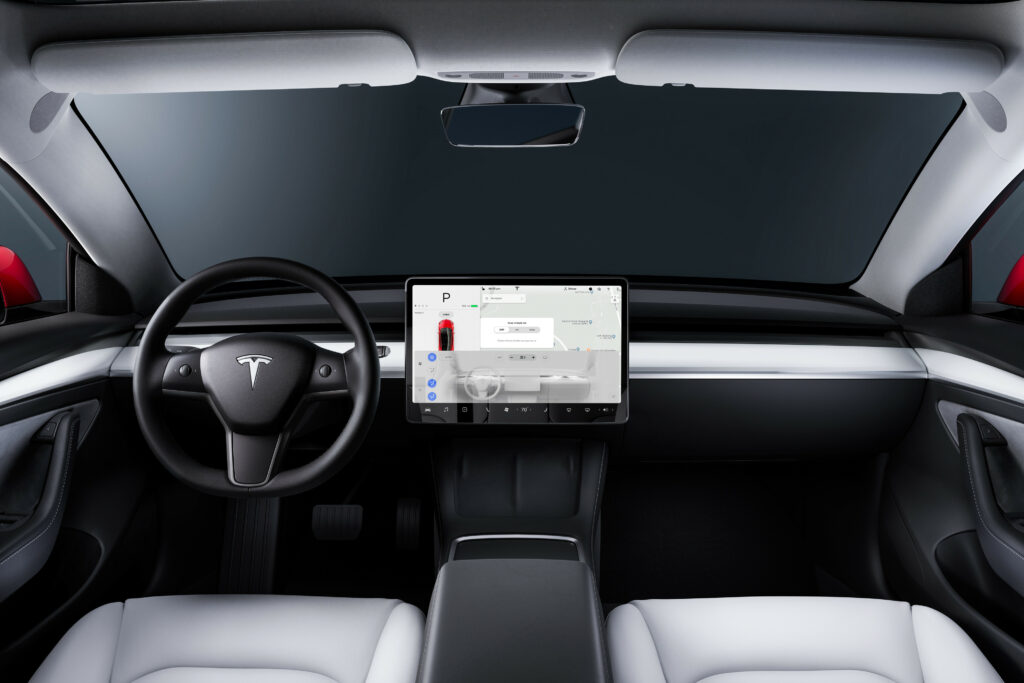
Federal Tax Credit: In 2024, the rear-wheel drive and all-wheel drive variants of the Tesla Model 3 have again lost the federal EV tax credit. This time, it’s not due to high sales, but because of battery sourcing.
Did You Know? Used Tesla prices have fallen dramatically since price cuts for new Tesla models were announced. See the latest used Tesla price forecast here.
Build and price the Model 3 at Tesla.com
As long as your Bolt has the new battery post-recall, the Bolt is by far the most affordable electric option available. But it’s not for road trips with the family.
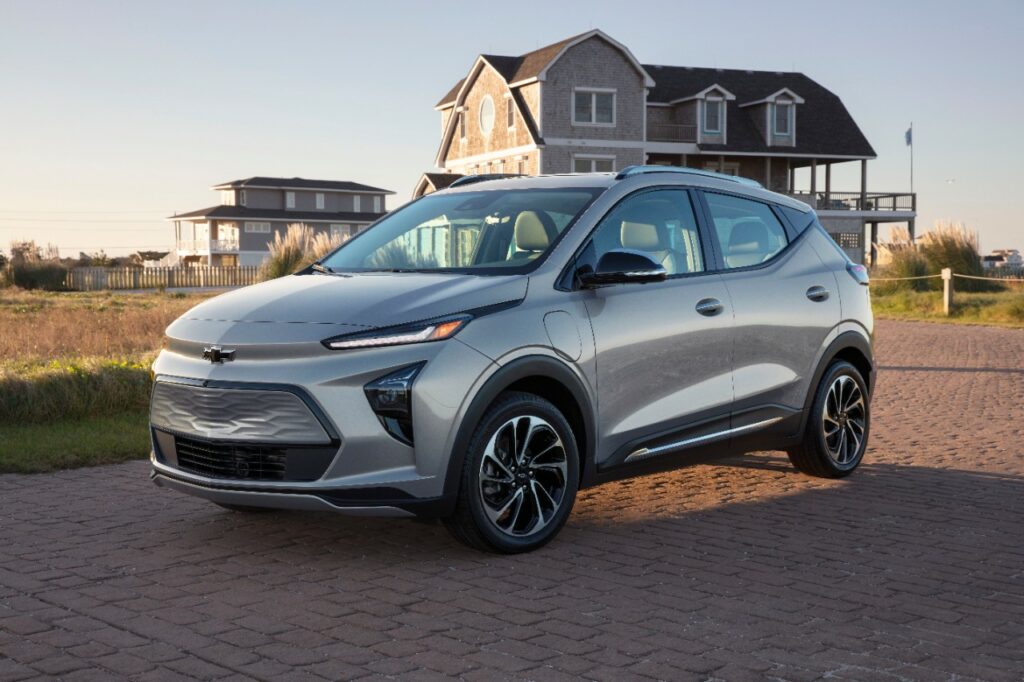
Price: $26,595 – $38,995
Range: 247 to 259 miles
Charging Speed: 55 kilowatt max (adds 200 miles in one hour of charging)

Federal Tax Credit: In 2024, the Bolt again qualifies for federal EV incentives. See full details here.
Did You Know? The Bolt has great range, but charges slowly. We think this is a great budget option for around town, but not for cross-country road trips.
Build and price your own Bolt EV or EUV at chevrolet.com
The new IONIQ 5 may have stolen the show, but the Kona EV is thousands of dollars cheaper. It’s one of the best EV values well under $50k. If you take frequent road trips, the Kona’s slow charging could be a deal breaker.

Price: $33,550 – $41,550
Range: 258 miles
Charging Speed: 100 kilowatt max (180 miles added in 47 minutes)

Federal Tax Credit: In 2022, the new revisions to the EV tax credit took away this incentive from the Kona EV. See full details here. State incentives may apply.
Did You Know? The all-new Hyundai IONIQ 5 has stolen the show with more range, MUCH faster charging, and better looks. Although MSRP starts closer to $45,000, dealer markups make it hard to find one under $50,000. More on that below.
Build and price your own Kona EV at hyundaiusa.com
Don’t like the looks of the Kona EV? The Niro is the same vehicle on the inside. Note that the Niro and Kona EVs are based on older EV powertrains, and charge quite slowly. Go for the Kia EV6 or IONIQ 5 for faster charging.

Price: From $40,875 with destination fees
Range: 253 miles
Charging Speed: 100 kilowatt max at a DC fast charger (adds 177 miles of range in about 45 minutes)

Federal Tax Credit: The new revisions to the EV tax credit took away this incentive from the Niro EV. See full details here. State incentives may apply.
Did You Know? The 2024 model year introduces a plug-in hybrid version with 33 miles of all-electric range. This is a great option for frequent travelers, rural drivers, and those without a place to charge at home.
Build and price your own Niro EV or plug-in hybrid
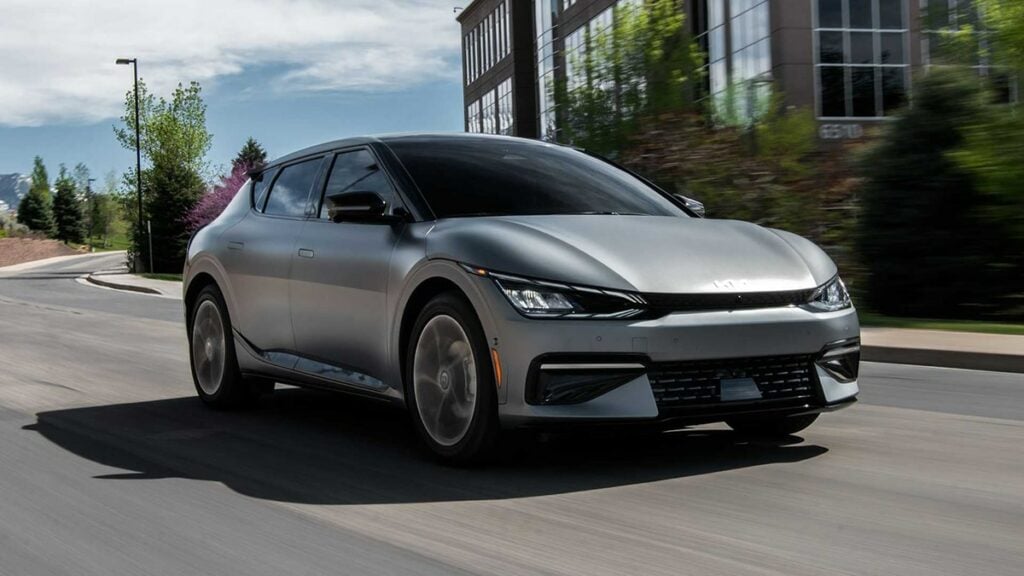
Price: $43,800 (Wind Rear-Wheel Drive)
Range: 310 miles
Charging Speed: 235 kilowatt max at a DC fast charger (adds 200 miles of range in about 20 minutes)
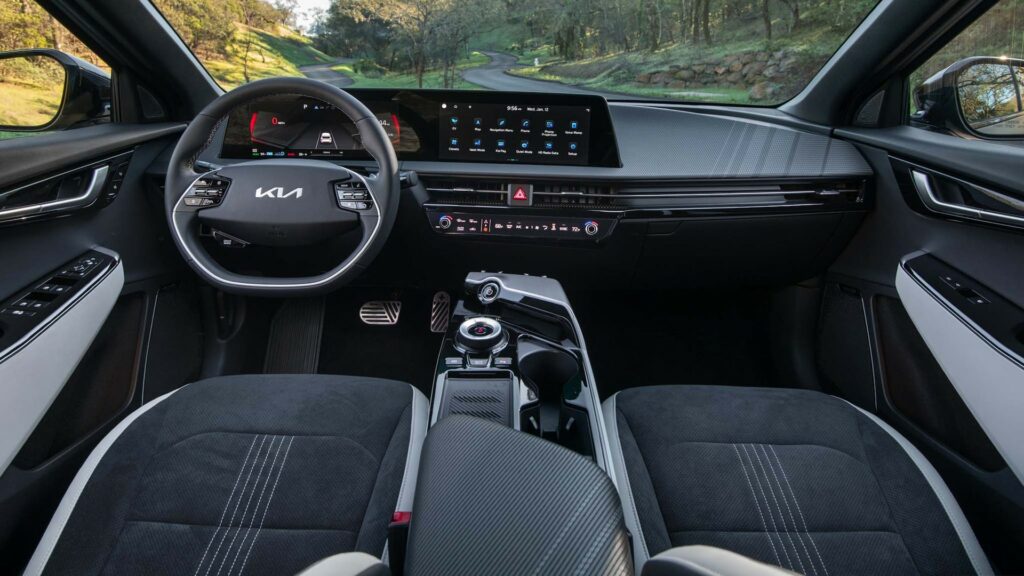
Federal Tax Credit: The new revisions to the EV tax credit took away this incentive from the EV6. See full details here. State incentives may apply.
Did You Know? The Kia EV6 is based on the same e-GMP electric platform as the Hyundai IONIQ 5. If the looks of the EV6 are too much for you, maybe the IONIQ 5 is up your alley. The EV6 comes with 1,000 kilowatt-hours of free charging at Electrify America. That’s about 15 charging sessions from 10% to 80%.
Build and price your own EV6 at kia.com
Despite winning so many awards in 2022, Hyundai has struggled to sell the IONIQ 5 due to the loss of the federal tax credit. See the latest IONIQ 5 inventory in your area.

Price: From $43,785 (SE Standard Range). Gain more range from $45,000+.
Range: 220 miles (Standard Range) to 310 miles
Charging Speed: 235 kilowatt max at a DC fast charger (adds 200 miles of range in about 20 minutes)

Federal Tax Credit: The new revisions to the EV tax credit took away this incentive from the IONIQ 5. See full details here. State incentives may apply.
Did You Know? The IONIQ 5 and it’s sibling the Kia EV6 are by far the fastest-charging EVs under $50,000. The IONIQ 5 has two years of free charging at Electrify America.
Build and price your own IONIQ 5 and hyundaiusa.com
Last but certainly not least, the entry-level Mustang Mach-E starts under $50k. Finding one without a dealer markup is a challenge.
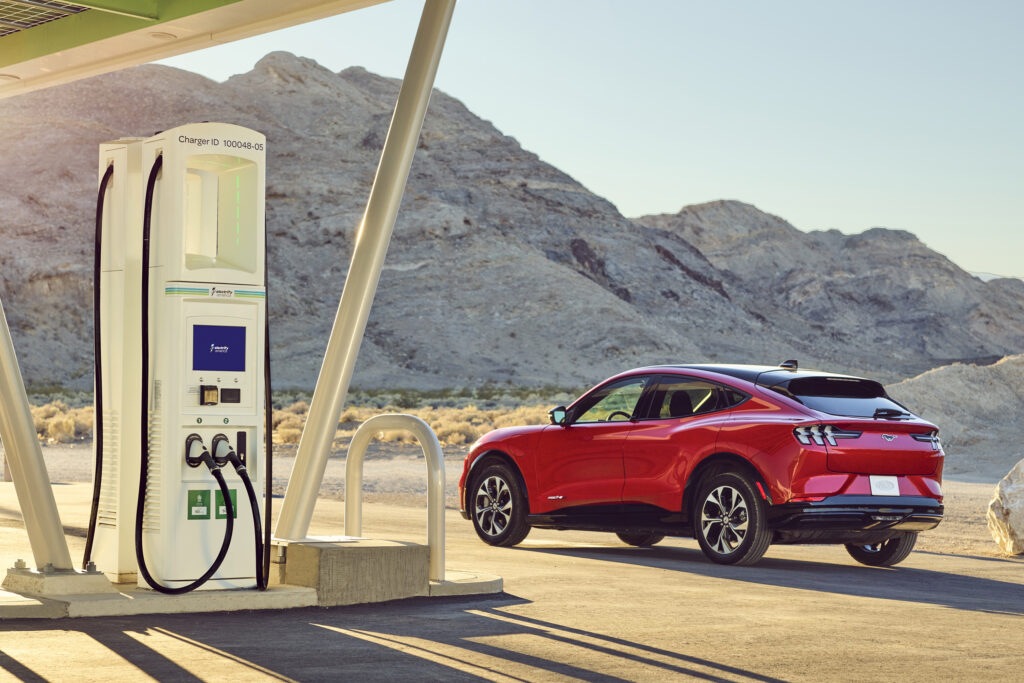
Price: Starting at $45,995
Range: 247 miles (Standard Range battery)
Charging Speed: 150 kilowatt max speeds (adds 170 miles of range in 35 minutes)

Federal Tax Credit: The Mustang Mach-E is made in Mexico, so it continues to qualify for at least half of the new EV tax credit. Qualification for the full credit depends on the battery supplier. See the latest from the federal government.
Did You Know? The Mustang Mach-E is one of the top-selling EVs in America, although it remains far behind Tesla.
Build and price your Mustang Mach-E at Ford.com
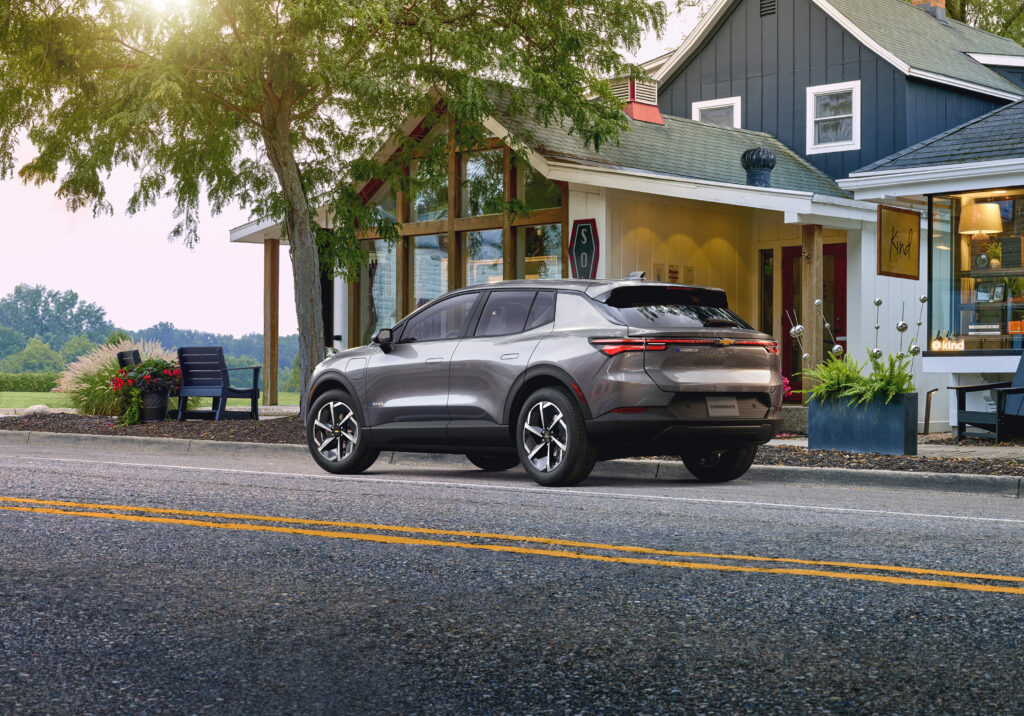
The Equinox EV was recently introduced, and GM still claims that it will start “around $30,000.” Even if the most preferred trim options run closer to $40,000, the Equinox EV looks to be a great deal.
Here are the standout specs GM has released:
See every detail released so far, from trim options to expected pricing
Don’t forget that both state and federal EV incentives may apply. Here’s our full breakdown of which models are likely to qualify. For the first time, a used EV tax credit is available, but very few models qualify due to the price cap. We’ve got the full details covered here.
Not sure which path is right for you? Head over to the CarEdge community forum to chat with auto experts with years of experience. I’m on the forum daily!

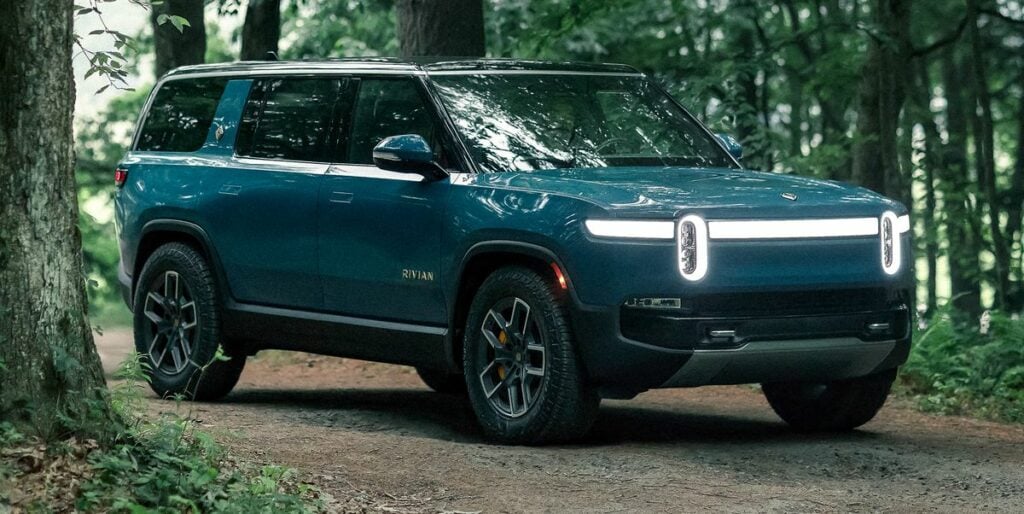
If you’re thinking about hauling the kids off to school with zero emissions, today’s EVs offer more range, faster charging and greater fuel savings. The best electric cars and SUVs for families are available in a wide range of options to meet your needs, and an even wider range of price points. These are the best electric crossovers and SUVs on sale in 2024.
If you need space for four, five, or maybe six people (plus those furry friends), these 3-row electric SUVs are built for you.

Reviewers absolutely LOVE the new Kia EV9. As the first mainstream 3-row electric SUV to hit the American market, the EV9 was highly anticipated. We can confirm that it has been worth the wait. Step inside this full-size SUV, and you’ll immediately note the spaciousness and luxurious feel of this premium-feeling Kia. This one is worth a test drive.
Price: $56,395 – $75,395
Range: 230 – 304 miles
Charging (public fast charger): can add 200 miles in 18 minutes
Passenger volume: 159 cubic feet (three rows, seats 6)
Cargo volume behind second row: 44 cubic feet
Total cargo volume: 82 cubic feet
NHTSA safety rating: Not Rated (5-Star Euro Rating)
See Kia EV9 new and used listings with local market data.

Rivian is just beginning to ramp up production and sales of the Rivian R1S, the full-size electric SUV companion to the R1T electric truck. The 2024 Rivian R1S is a blend of luxury and off-road capability. This 3-row EV is made in America, at a converted manufacturing facility in Normal, Illinois. We can only recommend this great vehicle if you live within a reasonable distance of one of Rivian’s service centers. If you end up needing service, you don’t want to pay for a long-distance tow truck!
Price: Starting at $74,900
Range: 316 miles
Charging (Public fast charger): can add 140 miles in 20 minutes
Passenger volume: (three-row SUV)
Cargo volume behind second row: 46.7 cubic feet
Total cargo volume: 104.7 cubic feet
Safety rating: Top Safety Pick+ by IIHS
Learn more about the Rivian R1S.
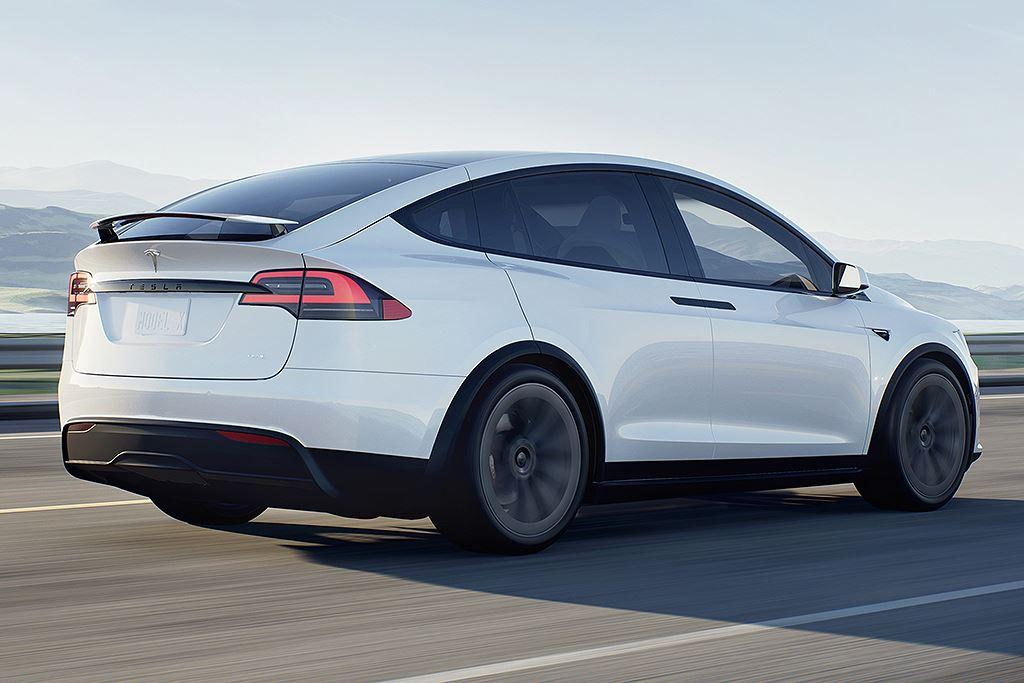
With gull-wing doors and a massive glass roof, there’s no hiding the fact that the Tesla Model X is a luxury SUV. In 2024, the Model X has seen multiple price cuts, and now starts around $80,000.
Price: $79,990 to $120,000+
Range: 351 miles
Charging (Public fast charger): can add 200 miles in 15 minutes
Passenger volume: N/A (three rows)
Cargo volume behind second row: 42.5 cubic feet
Total cargo volume: 92.3 cubic feet
Safety rating: 5 stars from Euro NCAP
See Tesla Model X new and used listings.
These electric crossover SUVs are the highest-rated, most-loved EVs for families today. Although they lack a third row, they’re plenty big enough for most families of four. Spaciousness, pricing, range and charging speeds vary from one electric model to another. We’ve also included NHTSA safety ratings if they’re available.

The Model Y is the best-selling electric vehicle in America. Model Y prices have fallen 20% from 2022’s highs. It’s now possible to buy a Model Y for well below $50,000 with the point-of-sale EV tax credit. Although it’s known for autonomous driving, the full capability (known as FSD) is a $15,000 package.
Price: $49,990 to $74,990
Range: 279 to 330 miles
Charging (Public fast charger): can add 200 miles in 15 minutes
Passenger volume: 106 cubic feet
Cargo volume behind second row: 26.6 cubic feet
Total cargo volume: 72 cubic feet
NHTSA safety rating: 5 stars
See Model Y new and used listings.
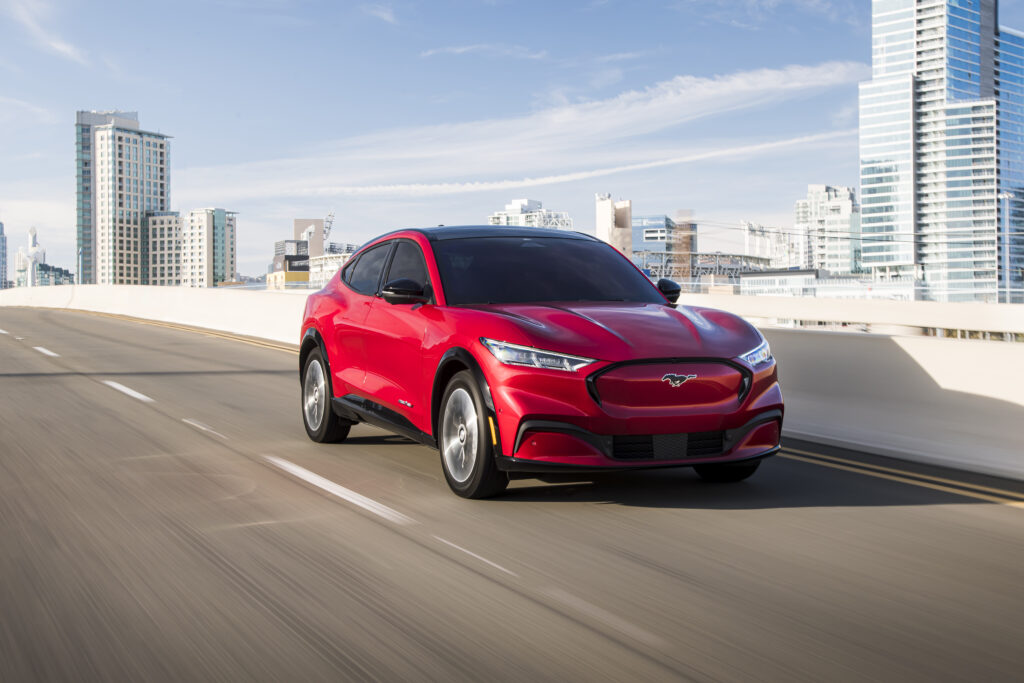
Ford’s first serious EV is very popular among small families and speed freaks alike. If the Mustang brand has a special place in your heart, this just might be the EV for you.
Price: $45,995 to $63,575+
Range: 224 to 312 miles of range
Charging (Public fast charger): can add 120 miles in 20 minutes
Passenger volume: 104.5 cubic feet
Cargo volume behind second row: 29.7 cubic feet
Total cargo volume: 59.7 cubic feet
Safety rating: IIHS Top Safety Pick
See Mustang Mach-E new and used listings.

I can confidently say that the IONIQ 5 is a great family car, and that’s because my wife and I haul our own kiddo around in this segment-bending electric crossover with hot hatch flavors. The IONIQ 5 has won many awards, including Car and Driver’s 2022 EV of the Year. It charges VERY fast, and that’s what I love most about the car.
Price: $40,925 to $57,400+
Range: 220 to 303 miles
Charging (Public fast charger): Adds 200 miles of range in 20 minutes
Passenger volume: 106.5 cubic feet
Cargo volume behind second row: 27.2 cubic feet
Total cargo volume: 59.3 cubic feet
Safety rating: Top Safety Pick Plus from IIHS
See Hyundai IONIQ 5 new and used listings.
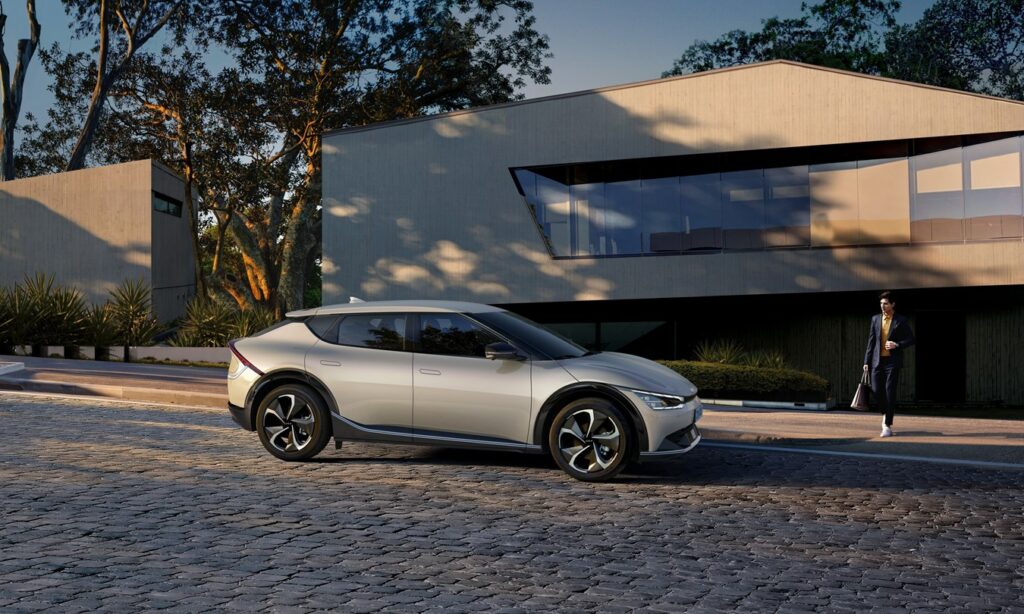
The spaceship-styled EV6 is Kia’s version of the Hyundai IONIQ 5, which shares the e-GMP electric powertrain. The Kia EV6 has slightly less passenger and cargo space than the Hyundai, but it’s better range and equally fast charging make it an obvious feature on this list of best electric cars for families.
One thing to bear in mind: most EVs, including the EV6 and IONIQ 5, have a flat floor, meaning that there’s a bit more interior space than it would appear. The best thing you can do is check one out in person!
Price: $43,920 to $61,600+
Range: 274 to 310 miles
Charging (Public fast charger): Adds 200 miles of range in 20 minutes
Passenger volume: 103 cubic feet
Cargo volume behind second row: 24.4 cubic feet
Total cargo volume: 50.2 cubic feet
Safety rating: In Europe, the EV6 earned 5 stars
See Kia EV6 new and used listings.
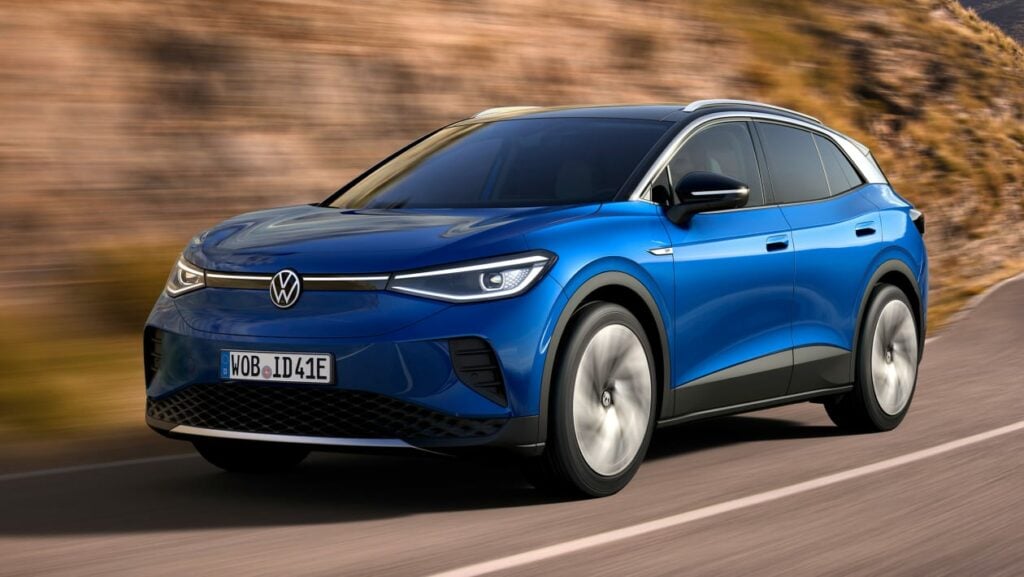
We have great news for those in search of an affordable and capable EV that qualifies for the federal tax credit. The ID.4 is now made in Tennessee at Volkswagen’s Chattanooga plant! The newest American-made EV is equipped with decent range, okay charging, and a comfortable interior that’s designed for families. However, don’t expect Tesla-level infotainment. The ID.4 is best for those who are content with the simpler things in life.
Charging speeds are merely okay, but the 2024 model year gets a decent improvement.
Price: $38,790 to $55,000
Range: 208 to 275 miles
Charging (Public fast charger): Adds up to 190 miles of range in 30 minutes
Passenger volume: 99.9 cubic feet
Cargo volume behind second row: 30.3 cubic feet
Total cargo volume: 64.2 cubic feet
Safety rating: Top Safety Pick Plus
See Volkswagen ID.4 new and used listings.
The Inflation Reduction Act eliminated the original EV tax credit and replaced it with a completely revised tax credit. For vehicles that qualify, up to $7,500 in tax credits are available. However, the incentive is based on battery sourcing, which will be determined by the automakers. Income limits restrict buyer eligibility, too. See the full details on qualifying models here.
There’s also a used EV tax credit for the first time, but a price cap of $25,000 eliminates every single family EV on this list.
Generous state and local incentives may make the switch to an EV much more affordable, depending on where you live. See the most generous state-level EV incentives, and check with the DSIRE clean energy incentive database to find more incentives for your specific location.
Which family-size electric car are you considering? Let us know in the comments, or better yet join the conversation at our CarEdge Community forum.
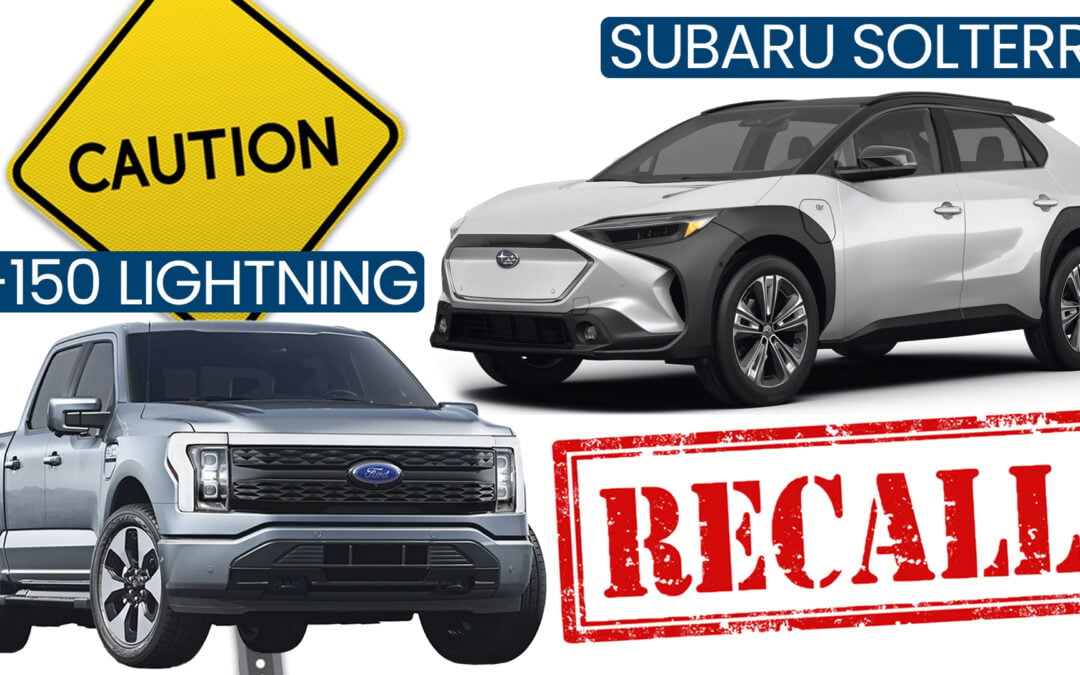
As drivers warm up to the idea of going electric, every electric vehicle recall is sure to turn heads, regardless of severity. 2022 is a huge year for automakers unveiling their next generation of electric vehicles. With over half a trillion dollars invested in EVs, there’s a lot riding on the success of these new arrivals. Several electric vehicle models have already been subjected to recalls. Fortunately, most of them do not directly involve electric powertrains. These are the EVs facing recalls in 2022. We’ll update this page as future recalls are inevitably announced.

October 2022 – Rivian recalled every vehicle it has produced, including all R1T electric trucks, R1S electric SUVs, and EDVs produced for Amazon. The vehicles were recalled because of concerns that a bolt in steering assemblies wasn’t sufficiently tightened.
No accidents have been reported, but the recall is still causing massive headaches for the young automaker. The recall fix is already available, it’s as simple as tightening a (very important) screw. However, the challenge lies in the limited locations of Rivian Service Centers. For example, the state of Texas has one service center in Houston. There are just 5 Rivian service centers on the entire East Coast. Most locations are in California. See the full list of locations.
Fortunately, Rivian has mobile service technicians, but they’ll surely have their hands full. See additional details on the Rivian recall here.
June 23, 2022 – The Toyota bZ4x and Subaru Solterra are EV siblings co-developed by the two Japanese automakers. Just a month into deliveries, the two models have been recalled globally due to an issue with their wheel hub bolts that could in fact cause the wheels to fall off. Fortunately, the issue does not involve Toyota and Subaru’s brand-new electric powertrain.
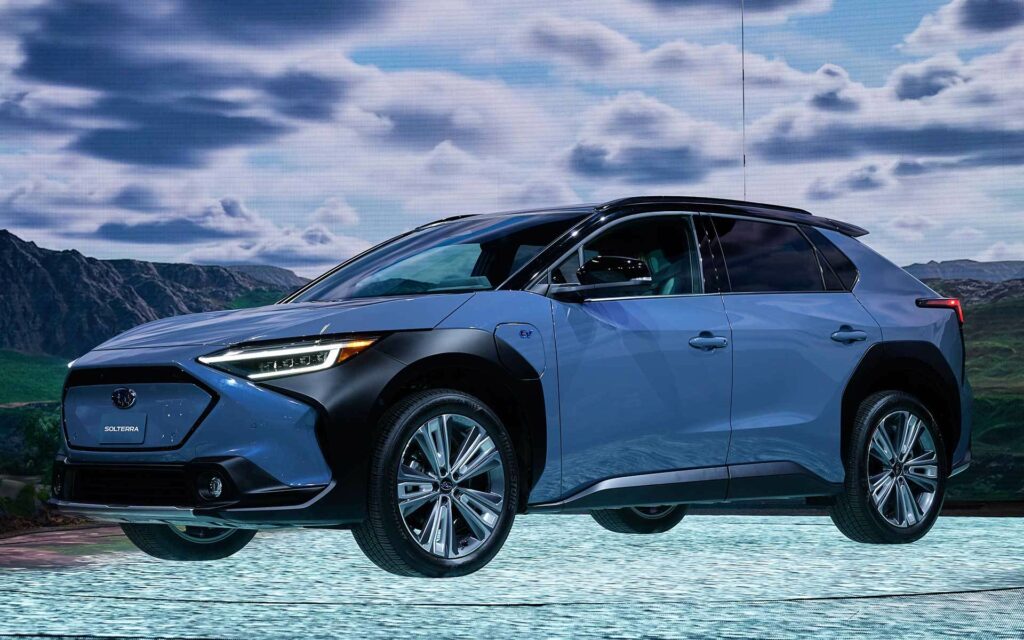
The US National Highway Traffic Safety Administration (NHTSA) recall notice warns owners not to drive their vehicles until they are repaired. This isn’t a good look considering the significance of Toyota’s first all-electric vehicle. A bZ4X and Solterra recall remedy is currently under development according to the US NHTSA.
“The cause of the issue and the driving patterns under which this issue could occur are still under investigation,” the notice says.
The recall affects 2,700 bZ4x models and 2,600 Solterras globally. See if your Toyota bZ4X VIN number is subject to the recall at Toyota’s official recall page. You can check if your Subaru Solterra is impacted at Subaru’s official recall site.
June 27, 2022 – The electric F-150 Lightning is the most-anticipated new model making a debut this year. Ford Motor is recalling 2,906 F-150 Lightnings because of a software issue that could result in a failure to provide low tire pressure warnings. The 200,000 F-150 Lightning reservation holders are certainly relieved to find that this recall is not related to Ford’s all-new electric powertrain.
In this particular recall, simple human error is at fault. Ford says that the recommended tire cold inflation pressure was incorrectly set to 35 psi instead of 42 psi. No accidents have resulted from this F-150 Lightning recall, but it’s the fix that’s noteworthy. The recall gives Ford a publicized opportunity to show the world that the F-150 Lightning is OTA capable. Over-the-air updates, first implemented on a large scale by Tesla, are no easy feat. Plenty of automakers can update navigation and infotainment via OTA update, but few are capable of firmware OTA updates that tinker with the powertrain.
Learn more about how over-the-air updates are changing how cars get serviced.
F-150 Lightning Recall Fix: Those who wish to receive the recall fix immediately may head to a Ford dealership service center immediately. Otherwise, Ford says the over-the-air update will be available to download via home WiFi within a few weeks. Check to see if your F-150 Lighting VIN number is impacted by the recall at Ford’s official recall page.
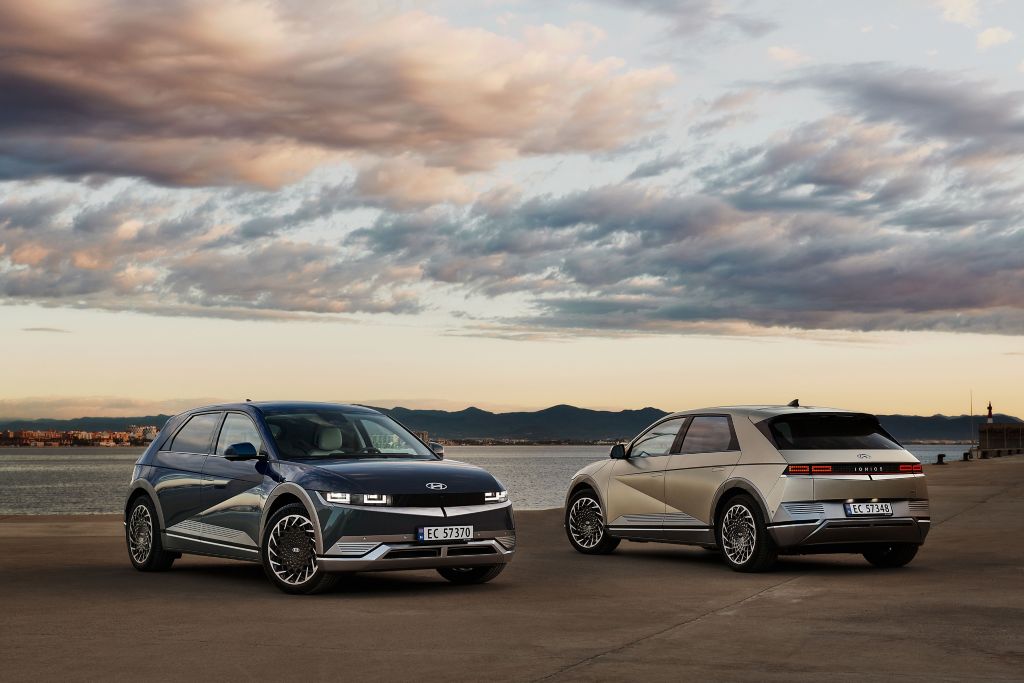
May 13, 2022 – As an IONIQ 5 owner myself, I was not thrilled to see the first manufacturer recall coming in one month into ownership. The US National Highway Traffic Safety Administration (NHTSA), Hyundai and Kia have announced a recall for select VIN numbers of the 2022 model year Hyundai IONIQ 5 and Kia EV6.
The IONIQ 5 and EV6 share Hyundai Motor Group’s new e-GMP electric platform. The recall is for the potential for disruptions to the vehicle’s parking actuator system when the vehicle is off. Sudden voltage fluctuations may occur while the vehicle is off, potentially causing the parked vehicle to disengage from ‘Park’ momentarily. If this occurs while the vehicle is parked on uneven terrain, vehicle rollaway is possible.
IONIQ 5 and EV6 recall fix: A fix is already available, but you’ll have to visit your Hyundai or Kia dealership service center. I just got the recall fix done at my local Hyundai dealer. They had never seen an IONIQ 5 before, and one employee asked if I was coming in for an oil change. Nevertheless, I was in and out of the dealership in about 30 minutes.
Check to see if your Hyundai IONIQ 5 is involved in this recall at Hyundai’s official recall page. You can see if your Kia EV6 is impacted at Kia’s official recall page.
Learn more about the IONIQ 5 recall here. Unfazed by the recall and looking to buy an IONIQ 5? Here’s how I found a Limited AWD IONIQ 5 at MSRP. It wasn’t easy.

June 14, 2022 – Ford is recalling all 50,000 Mustang Mach-E electric crossovers because of the risk of power loss. The possible power loss could occur while the vehicle is in motion or parked.
The recall is due to problems with the Mustang Mach-E’s battery contactor, which is a switch that determines which vehicle components the battery sends power to. Interestingly, the power loss is more likely to occur when putting the pedal to the metal for maximum acceleration, according to Ford. If power loss occurs, a powertrain malfunction warning light will illuminate on the dashboard, and the vehicle will display “Stop Safely Now’ in the gauge cluster behind the steering wheel. Clearly, it’s time to pull over immediately with a message like that.
Ford Mustang Mach-E recall fix: Ford has pursued Tesla in more ways than one. In addition to ending EV lease buyouts and going for direct-to-consumer sales via Ford Model e, Ford has brought over-the-air updates to its lineup. Ford says that Mustang Mach-E owners will receive an over-the-air update sometime in July to install a software remedy for the recall. Until then, a stop-sale is in place.
Learn more about the Ford Mustang Mach-E recall at Ford’s official recall page.
Several hundred automotive recalls happen every year across vehicle classes and powertrains. There will surely be more to come. What we’ll be keeping an eye on is how the latest electric powertrains are performing. Luckily, most of the EV recalls to date have been for components other than the electric powertrain. However, we all remember how the Chevrolet Bolt recall and fire hazard tarnished GM’s reputation. Check back for the latest updates!
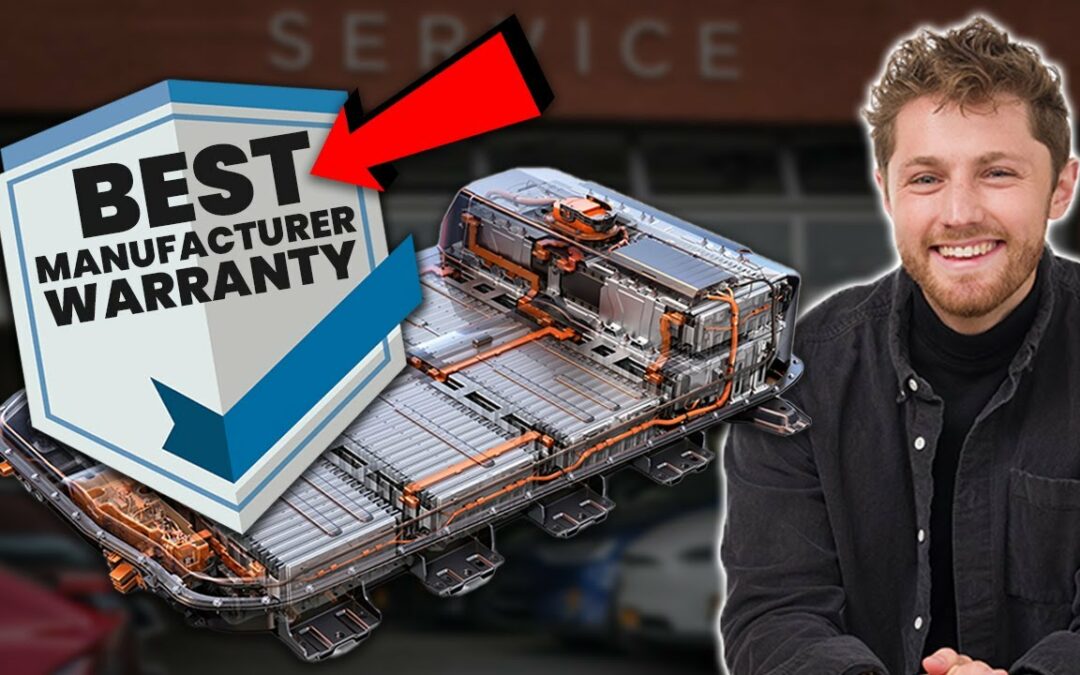
Electric vehicle batteries are expensive to replace — often $10,000 to $20,000 for a fully electric car. While battery costs are expected to drop in the coming years, today’s EV drivers need strong warranty coverage to protect their wallet.
By federal law, all EV and hybrid batteries must be covered for at least 8 years or 100,000 miles. In California, that coverage extends to 10 years or 150,000 miles. But not all warranties are created equal. Some go further than others when it comes to battery degradation, replacement criteria, and coverage for second owners.
So, which EV brands offer the most comprehensive battery warranties in 2025? The top spot might surprise you.
Rivian (8 years or 175,000 miles)
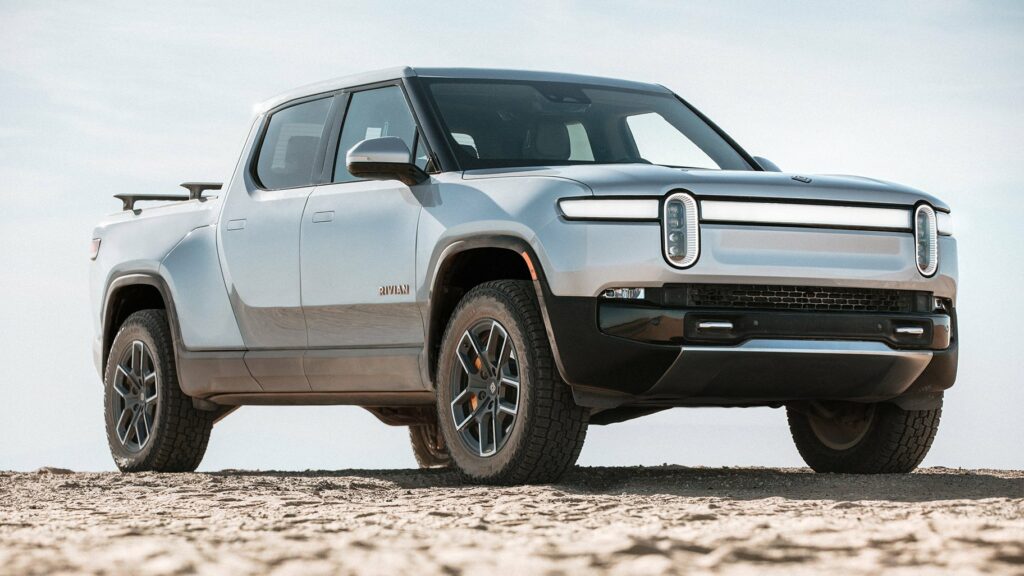
Surprise! The best EV warranty is offered by Rivian for the all-new R1T electric truck and R1S electric SUV. Coverage includes all components inside the high-voltage battery and 70% or more of the battery capacity for 8 years or 175,000 miles, whichever comes first.
Drivetrain components are also covered for 8 years or 175,000 miles. It can be unnerving to purchase a vehicle from a startup like Rivian, so at least they’re offering the best battery warranty there is. Learn more about Rivian’s warranty here.
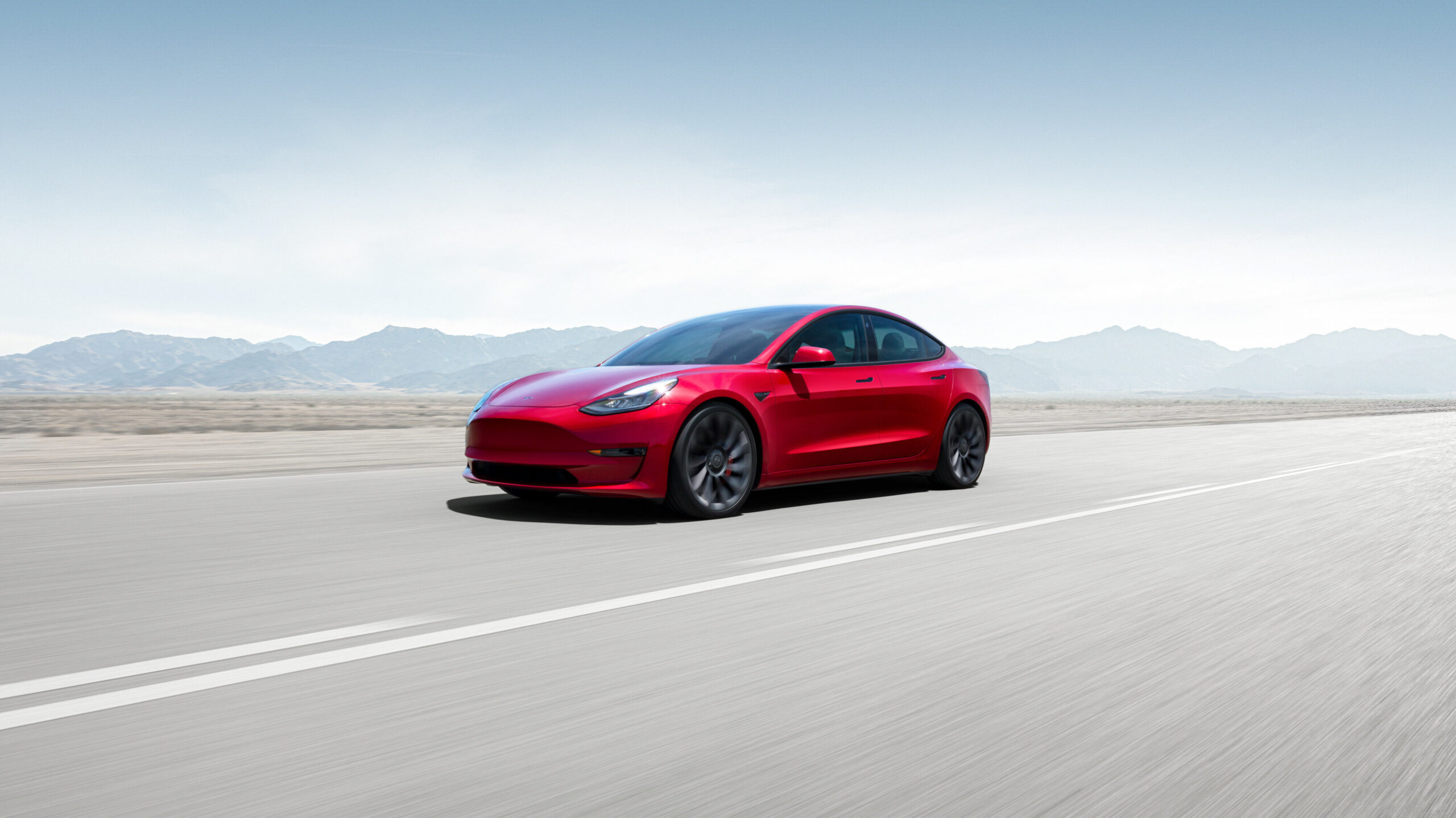
Tesla’s electric powertrain warranty is split into two tiers.
Learn more about Tesla’s battery warranty.
Hyundai and Kia (10 years or 100,000 miles)
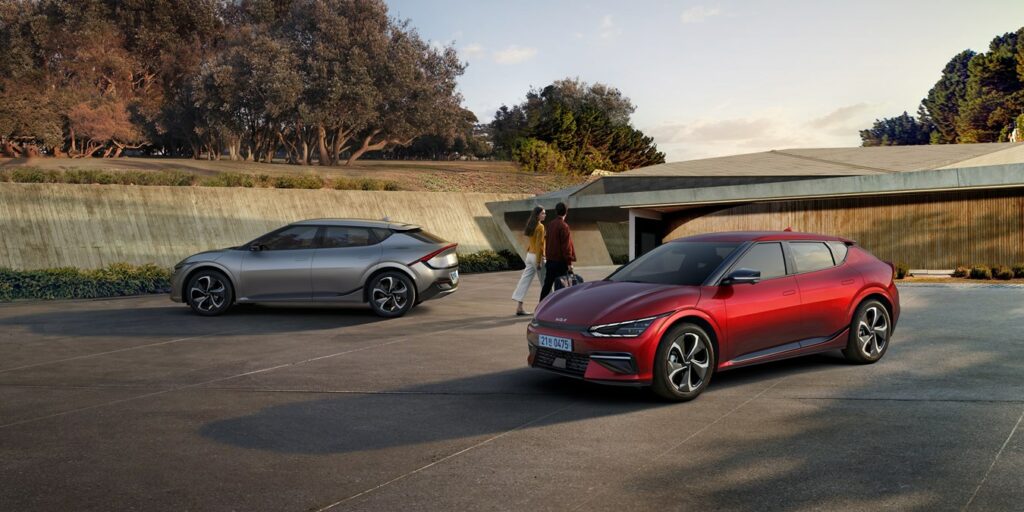
When shopping affordable EVs, you can’t beat Hyundai and Kia’s 10 year/100,000 mile EV warranty. The Hyundai EV warranty covers batteries, motors and powertrain components. There’s also the guarantee of at least 70% battery capacity retention. Hyundai lays it out clearly: “While all electric-car batteries will experience degradation over time, ours will not degrade more than 70 percent of the original capacity during the warranty period.”
Learn more about Hyundai’s electric vehicle battery warranty. You can find Kia’s EV warranty details here.
In 2025, it looks like the industry standard for EV manufacturer warranties is 8 years or 100,000 miles, whichever comes first. This manufacturer warranty applies to the following electric vehicles in 2024:

GM electric models like the Chevrolet Equinox EV, Blazer EV, and Cadillac Lyriq have 8 year/100,000 mile battery warranties with a notable catch. The battery retention portion of the warranty will replace the battery if it falls below 60% of the original capacity under coverage. See the full details here.
Q: What do EV battery warranties cover?
A: Most EV battery warranties cover defects in materials and workmanship, as well as capacity loss beyond a certain threshold (usually 70% of the original capacity). If your battery fails or degrades too quickly, it should be repaired or replaced under warranty.
Q: How long are EV battery warranties?
A: Federal law requires at least 8 years or 100,000 miles of coverage. In California and other CARB-aligned states, coverage extends to 10 years or 150,000 miles. Some automakers go above and beyond these minimums.
Q: Who has the best EV battery warranty in 2025?
A: As of 2025, Hyundai and Kia offer some of the most generous EV battery warranties, with 10-year/100,000-mile coverage that includes transferable protection and specific degradation thresholds. Tesla, Ford, and Toyota also offer strong warranties, but terms vary, especially for used EVs.
Q: Do EV battery warranties transfer to new owners?
A: In many cases, yes — but not always. Some automakers offer fully transferable warranties, while others reduce or void coverage after resale. Always confirm the terms before buying a used EV.
Q: Can I get extended protection for my EV battery?
A: Yes. If you plan to keep your EV long-term, an extended warranty can provide added peace of mind. With CarEdge extended warranty plans, you can cover high-cost components like the battery and electric motor after the factory warranty ends.
CarEdge is a trusted resource for car buyers, offering data-backed insights, negotiation tools, and expert guidance to help consumers save time and money. Since 2019, CarEdge has helped hundreds of thousands of drivers navigate the car-buying process with confidence. Learn more at CarEdge.com.

You don’t have to spend one hundred grand to purchase an electric vehicle with great range in 2022. EVs aren’t cheap, but with fuel savings taken into account, the electric lifestyle starts to sound a lot more appealing. There’s a saying in electric mobility: range is king. That’s especially true for frequent road-trippers and those who live in one of America’s remaining charging deserts. These are the electric vehicles with the most range in 2022.
Note: We’ve decided to place an emphasis on affordable electric vehicles with the most range. Affordability is a moving target in 2022’s crazy auto market, but in the realm of EVs, we’ve defined ‘affordable’ as EVs under $65,000. If you’re in the market for luxury, we’ve got those covered too.
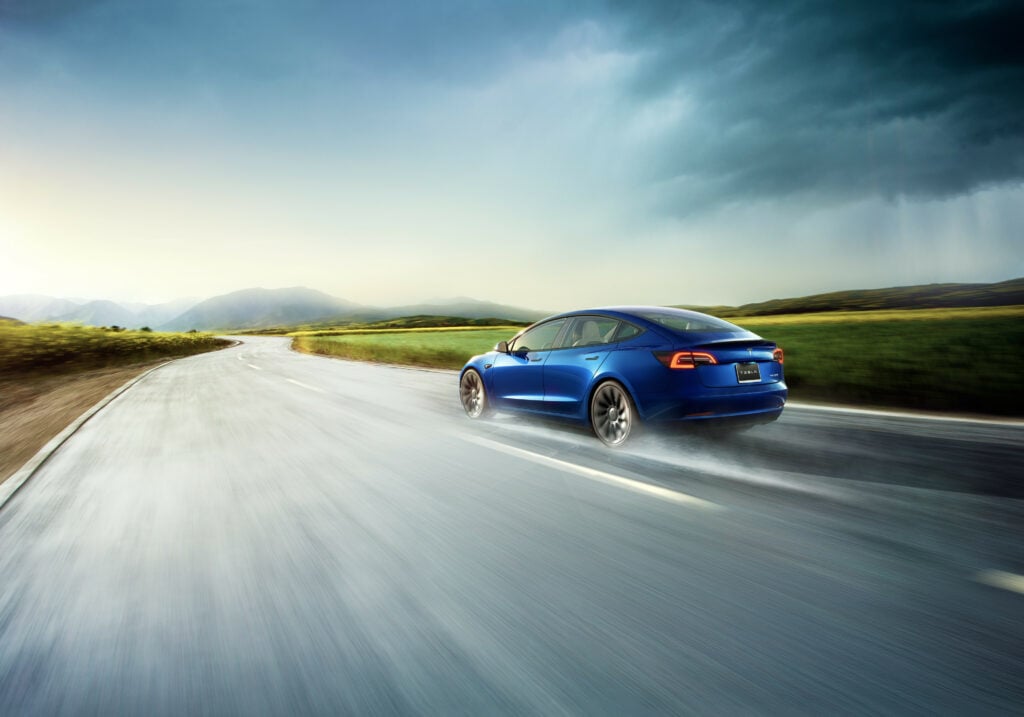
Range: 358 miles
Price: $57,190 with destination
Max charging speed: 250 kW (20-80% in 20 minutes, adding 214 miles of range)
0-60 mph (fun factor):
Federal EV tax credit qualification: No, credits were exhausted. Learn about EV incentives here.
See our full review of the 2022 Tesla Model 3 Long Range here.
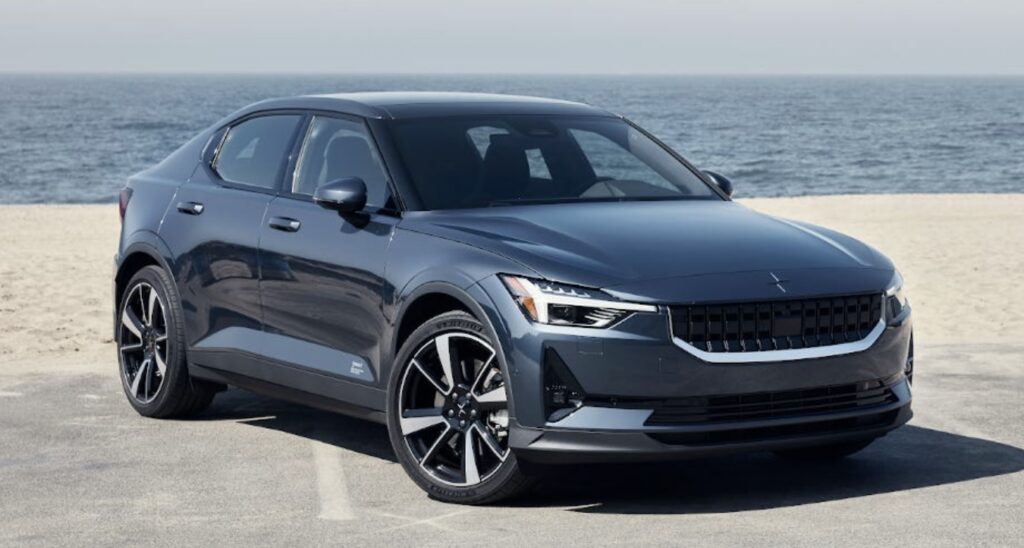
Range: 270 miles
Price: $49,800 with destination
Max charging speed: 250 kW (20-80% in 20 minutes, adding 214 miles of range)
0-60 mph (fun factor): 6.8 seconds
Federal EV tax credit qualification: Yes, learn more about EV incentives here.
See our full review of the Polestar 2 here.
Range: 272 miles
Price: $48,190 with destination
Max charging speed: 150 kW (20-80% in 20 minutes, adding 163 miles of range)
0-60 mph (fun factor): 5.8 seconds
Federal EV tax credit qualification: No, credits were exhausted. Learn about EV incentives here.
See our full review of the 2022 Tesla Model 3 here.

Range: 259 miles
Price: $26,595 with destination (most affordable EV available today)
Max charging speed: 55 kW (adding 100 miles of range in 30 minutes, or 200 miles of range in 75 minutes)
0-60 mph (fun factor): 6.8 seconds
Federal EV tax credit qualification: No, credits were exhausted. Learn about EV incentives here.
See our full review of the Chevrolet Bolt here.
Here’s our list of the cheapest electric cars available today
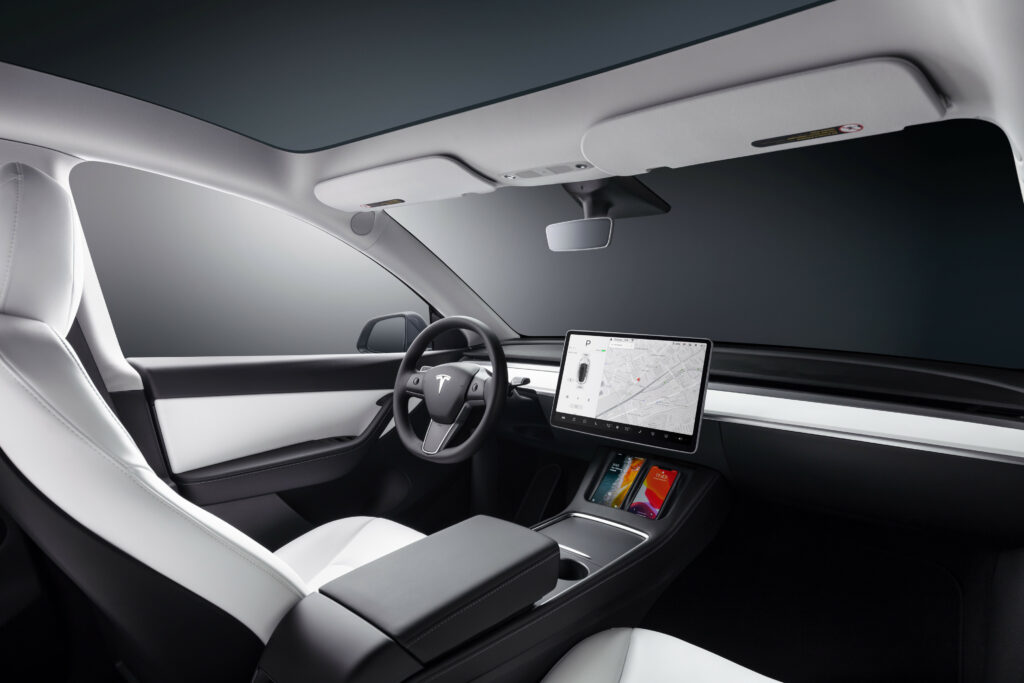
Range: 330 miles
Price: $64,190 with destination
Max charging speed: 250 kW (adding 100 miles of range in 30 minutes, or 200 miles of range in 75 minutes)
0-60 mph (fun factor): 4.8 seconds
Federal EV tax credit qualification: No, credits were exhausted. Learn about EV incentives here.
See our full review of the Tesla Model Y here.

Range: 310 miles
Price: $42,155 with destination
Max charging speed: 235 kW (15-80% in 20 minutes, adding 217 miles of range in 18 minutes)
0-60 mph (fun factor): 7.3 seconds
Federal EV tax credit qualification: Yes, learn more about EV incentives here.
See our full review of the Kia EV6 here.
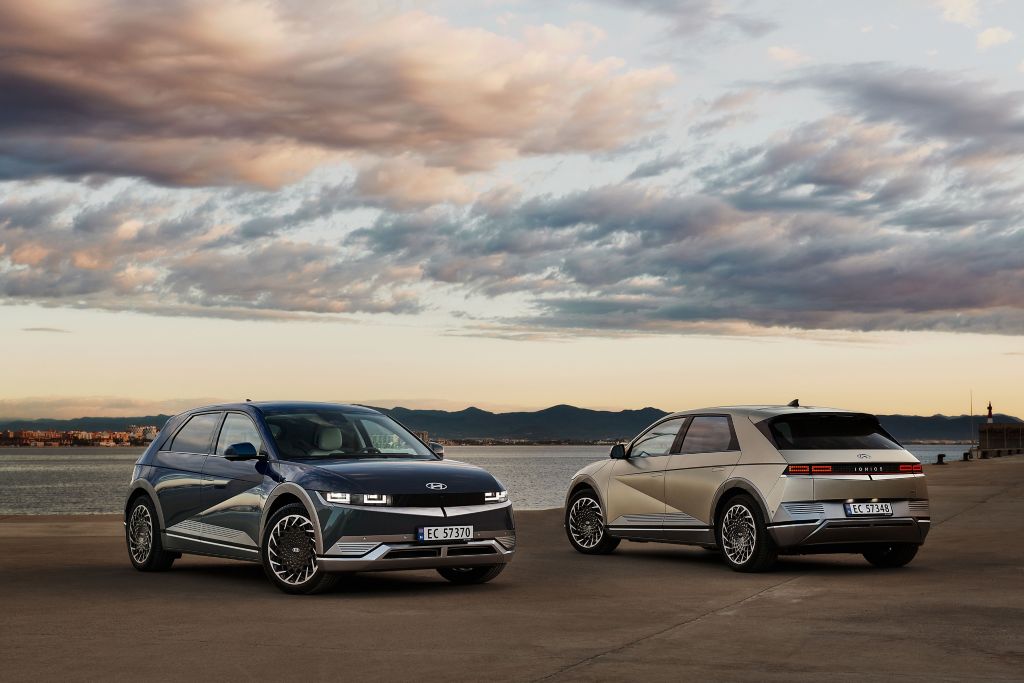
Range: 303 miles
Price: $45,295 with destination
Max charging speed: 235 kW (15-80% in 20 minutes, adding 197 miles of range in 18 minutes)
0-60 mph (fun factor): 7.5 seconds
Federal EV tax credit qualification: Yes, learn more about EV incentives here.
See our full review of the Hyundai IONIQ 5 here.
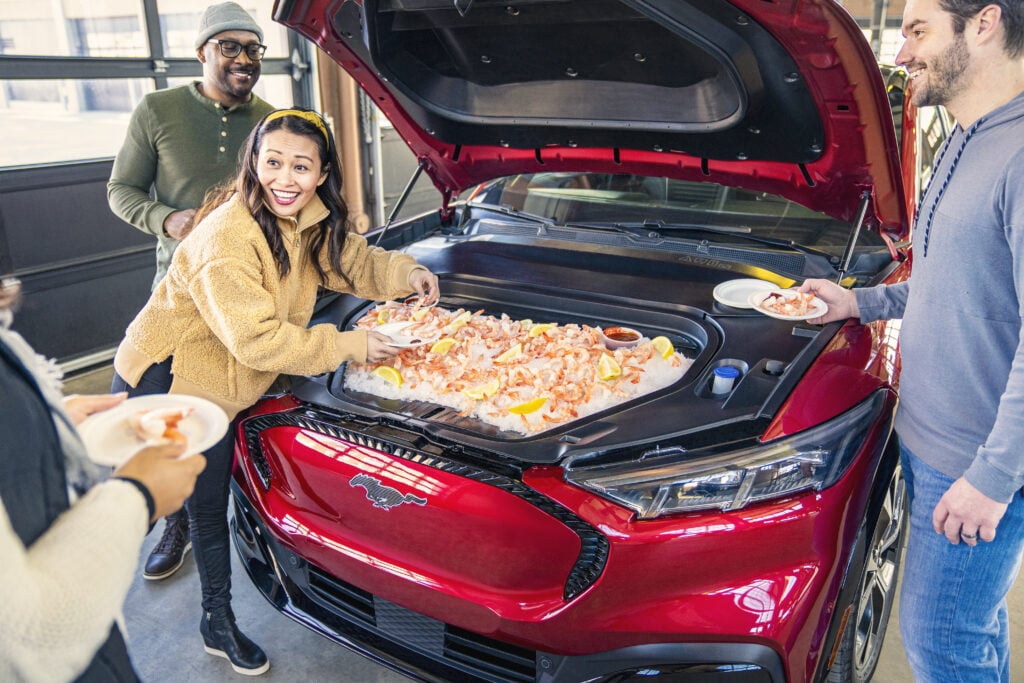
Range: 314 miles
Price: $53,550 with destination
Max charging speed: 150 kW (10-80% in 45 minutes, adding 220 miles of range)
0-60 mph (fun factor): 6.1 seconds
Federal EV tax credit qualification: Yes, learn more about EV incentives here.
See our full review of the Ford Mustang Mach-E here.
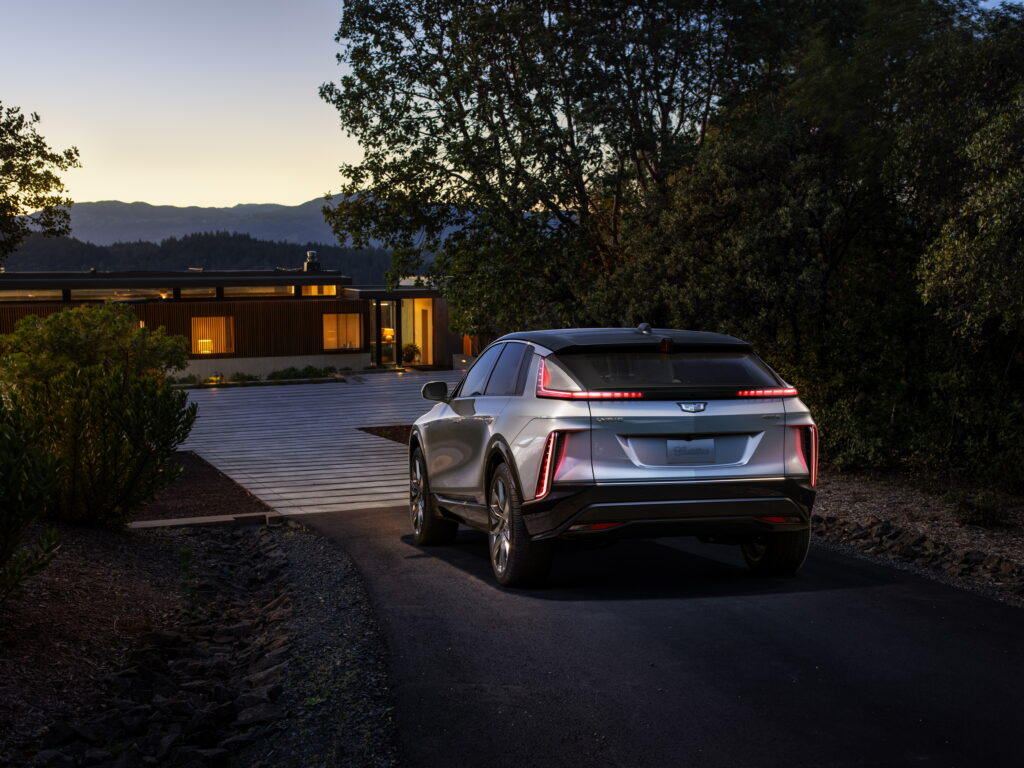
Range: 312 miles
Price: $64,185 with destination
Max charging speed: 190 kW (adding 195 miles of range in 30 minutes)
0-60 mph (fun factor): 6.4 seconds
Federal EV tax credit qualification: No, credits were exhausted. Learn about EV incentives here.
See our full review of the Cadillac Lyriq here.
See the latest EV availability and wait times for EVERY model
There are now three electric pickup trucks on American roads, but buying one is easier said than done. Everyone wants one, and wait lists extend months and in some cases, years. We’ve decided to include electric trucks that are not yet available for purchase, so long as specs have been released and reservations or orders can be placed today.
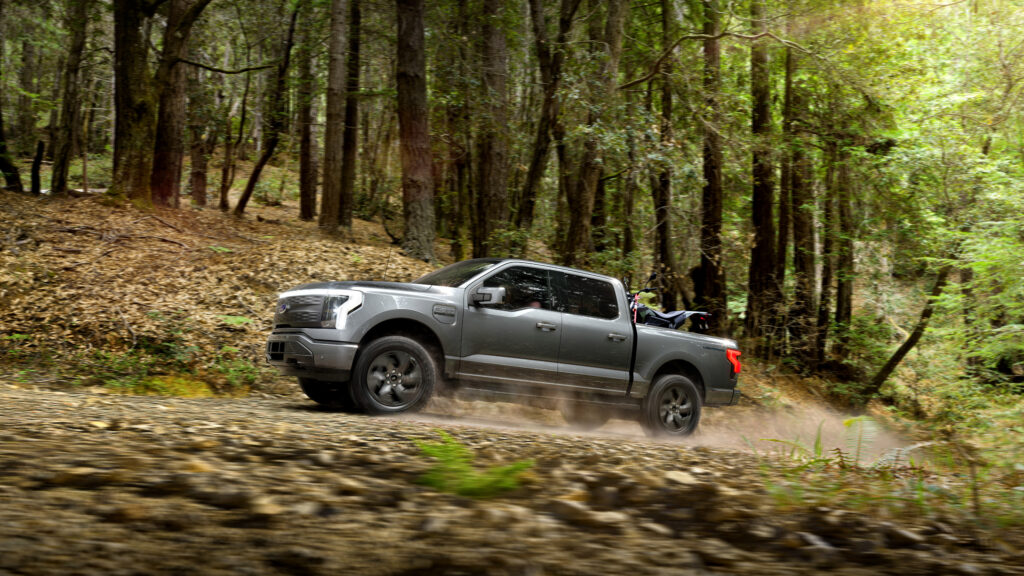
Range: 320 miles
Price: $72,474
Max charging speed: 130 kW (15-80% in 40 minutes)
0-60 mph (fun factor): estimated 4.5 seconds
Federal EV tax credit qualification: Yes, learn more about EV incentives here.
See our full review of the F-150 Lightning here.
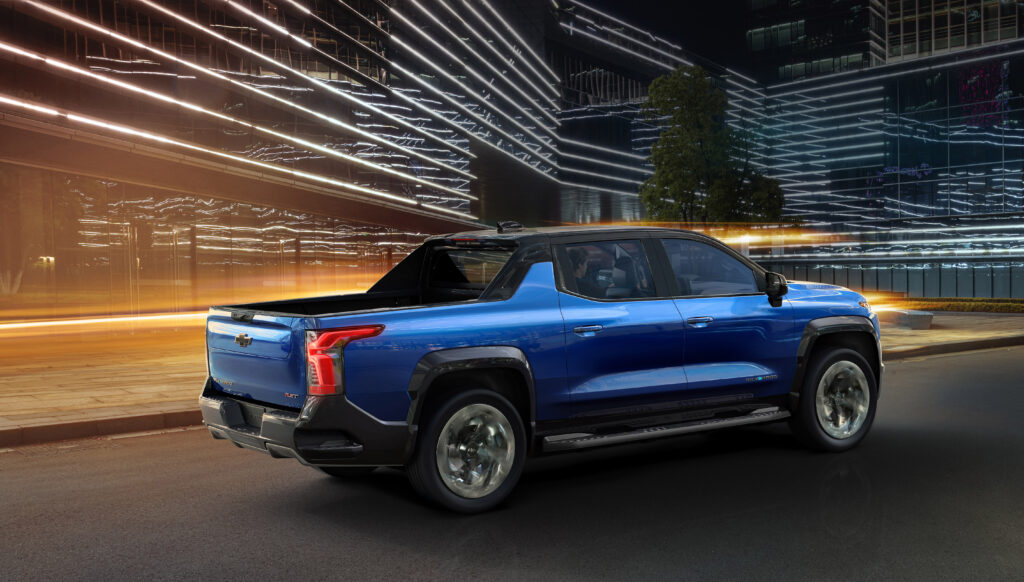
Range: Estimated 400 miles
Price: $42,000 – $100,000+
Max charging speed: 350 kW (adding 100 miles of range in 10 minutes)
0-60 mph (fun factor): N/A
Federal EV tax credit qualification: No, credits were exhausted. Learn about EV incentives here.
See our full review of the Silverado EV here.
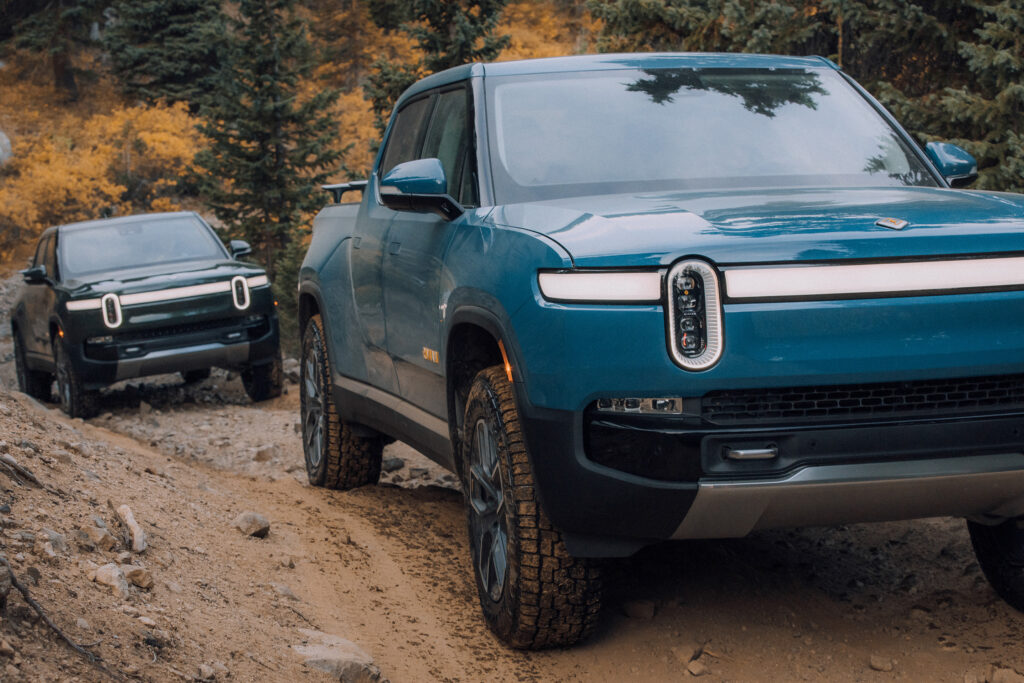
Range: 314 miles
Price: $80,000 – $100,000+
Max charging speed: 220 kW (10-80% in 40 minutes)
0-60 mph (fun factor): 3.0 seconds
Federal EV tax credit qualification: Yes, learn more about EV incentives here.
Learn more about Rivian’s R1T and R1S full-size SUV.
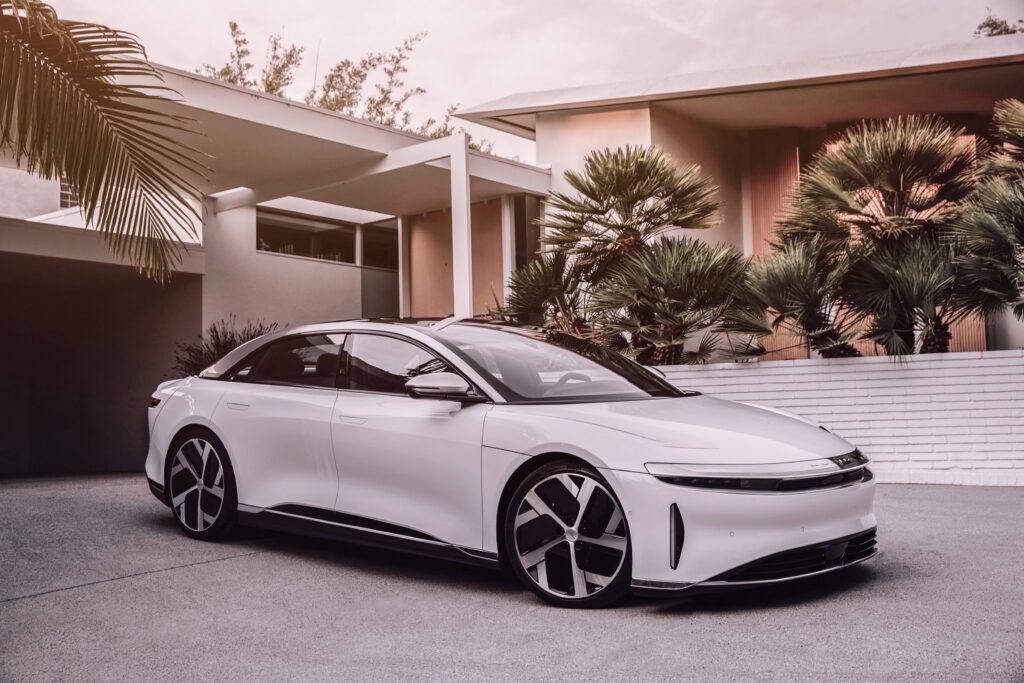
Range: 516 miles
Price: $139,000
Max charging speed: 300 kW (adding 300 miles of range in 20 minutes)
0-60 mph (fun factor): 2.6 seconds
Federal EV tax credit qualification: Yes, learn more about EV incentives here.
See our full review of the Lucid Air here.
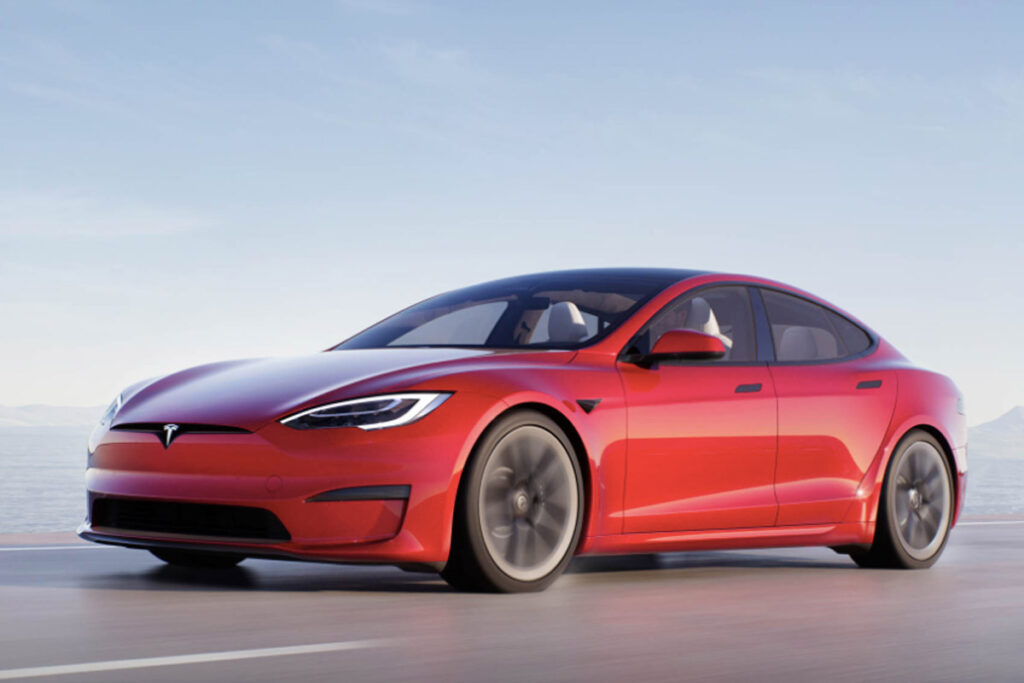
Range: 405 miles
Price: $101,990
Max charging speed: 250 kW (adding 200 miles of range in 15 minutes)
0-60 mph (fun factor): 3.1 seconds
Federal EV tax credit qualification: No, credits were exhausted. Learn about EV incentives here.
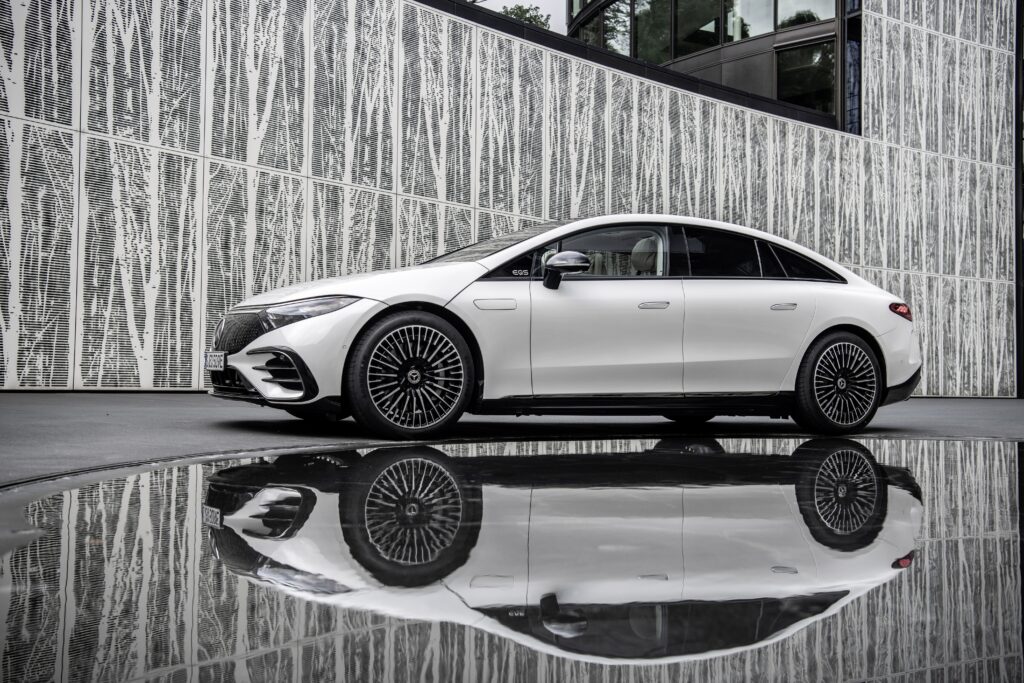
Range: 350 miles
Price: $139,000
Max charging speed: 200 kW (adding 200 miles of range in 20 minutes)
0-60 mph (fun factor): 5.5 seconds
Federal EV tax credit qualification: Yes, learn more about EV incentives here.
See our full review of the Mercedes EQS here.
What does the future hold? Not necessarily more range, surprisingly. Many auto analysts expect range for relatively affordable EVs to settle in around the 250-350 mile range. Why? Battery shortages loom on the horizon. Raw materials are in high demand, and there are only so many places on Earth to get lithium, cobalt and other materials.
Should you buy an EV now or wait? If you can find what you want for MSRP or very close to it, it just might be the right time to buy or lease. All signs point towards higher EV prices for 2023 and 2024 model years.